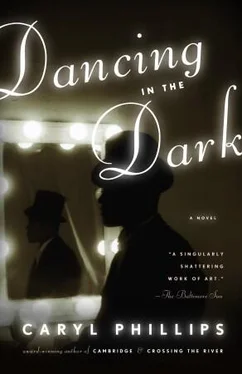Back in Harlem, he sleeps now in a different room than Mother, but she never mentions this fact. These days, neither the thought nor the touch of his wife produces any stirring of ardor in his loins and so he eventually deemed it best to make a dignified, if somewhat clumsy, exit from their bedroom. Surrounded by his precious hardbound volumes, which sit on handsome dark oak shelves, their spines broken, the leather rubbed thin, he sits up late into the night and smokes cigarette after cigarette as he reads. In the morning the din of street traffic announcing a new day often finds him still seated but asleep, the book having slid to the floor at some point in the night. Bert’s triumphant return to the United States and the pressures of his increased fame have finally convinced his wife that indeed she can now afford to retire from the stage and devote herself to home and husband. However, her disconsolate days, and lonely nights, begin to trouble her for she is incapable of fully inhabiting this new role of wife and lady of the house if her husband is reluctant to take up his part. The national tour of In Dahomey having been completed, each evening he now leaves with a curt but polite farewell for Hammerstein’s Victoria, where he and George are playing a limited season. And then, after the show, he stops in at Metheney’s before ambling back to 2309 Seventh Avenue under the cover of night. George, on the other hand, often hurries over to the Variety Theatre to catch the last part of Eva’s act for he finds himself possessed by an intoxicating affection that he thought himself incapable of feeling for any woman. Although Ada is still slender, and firm-bodied, George understands that he is making a young widow of his wife, but what can he do?
At the Victoria, Williams and Walker perform “The Detective Story” from their hit in the all-black musical In Dahomey . In the humorous sketch Walker tells stories about Nick Carter and the Old Sleuth. Williams sings his well-known songs “Nobody” and “Pretty Desdamone.”
HAMMERSTEIN’S VICTORIA PLAYBILL,
NOVEMBER 1905
Having unleashed every fighting phrase at his disposal, George now glares at their promoter and tries to control his desire to spit in the face of this fool. Why can Bert not see that this man is talking down to them? And if he does see it, why can he not open his mouth and say something? After all, they are stars. Williams and Walker are no longer boys fleeing Cripple Creek, and this is not the Barbary Coast. They have headlined on Broadway and in London’s West End, and it is to Broadway that they should be returning with their new show, Abyssinia , which, like their previous success, will eschew the razors, the chickens, the loose women, and the low talk of regular coon performances. They are the most important, and the most serious, colored performers in America so who is this man to suggest that they now play at Columbus Circle? George struggles manfully to control his temper, but Bert embraces silence and his partner looks helplessly at him. Sometimes Bert behaves as though his makeup is an extra layer of skin that he cannot rub away, and George worries that perhaps both Bert’s unfortunate blackface performance and his disturbingly accommodating personality are becoming somewhat confused in his partner’s mind. George Walker shakes his head for his disposition has now soured, trapped as he is between a damn fool promoter and a foolish friend, neither of whom seem to have noticed that they have entered the twentieth century.
Since their return from England, both Bert and George have been discovering something nearly akin to a new city. Long Acre Square was now proudly styling itself Times Square, while a novel subway system from City Hall, in the south, all the way north to 145th Street was enabling New Yorkers of all stations of life to ride either above or beneath the earth. Colored citizens and performers continued to flood uptown to Harlem, and although life at Marshall’s wasn’t what it used to be, Jimmie Marshall was still committed to working out the life of his lease. The pair of them greet a visibly deflated proprietor, and then sit quietly by themselves in the far corner of the lounge. It is clear to all who look on that there is no desire on the part of either man for social small talk, and so despite their fame nobody approaches them. George speaks first. “If we have to go to court, then we go to court. I keep telling you, ain’t no way we can play at Columbus Circle, not after Broadway. It makes no damn sense.” Bert slowly fingers his cigarette. He takes a long draw, then exhales, all the while looking directly at his partner, and George waits patiently until his friend is good and ready to speak. “You know,” begins Bert, “if you don’t mind making our business public for all the world to see, then I guess you must go right ahead. But I’d rather we did this another way. A quieter way.” George leans back in his chair and sighs deeply, but he remains determined that there should be no dispute between the two of them. He watches as Bert jams his cigarette into the ashtray, the frustration of the action betraying his exterior calm. “Bert, if we gotta make public our drawers in order to get rid of this white fool, then that’s what we must do.” Bert watches his friend’s indignation rise. “Man, we’re just looking for a fair shake and we’re not his boys, not then and not now.” George pauses. “Especially not now.” Bert looks at his partner and then slowly nods his head as he reaches for another cigarette.
George sits alone in the dark. The framed photograph on the mantelpiece of the living room seizes his attention, and he recalls the anxious white man who corralled together the four finely dressed colored entertainers for this promotional picture. The man barked instructions and tried to position the Negro dancers without actually touching any of them, but the more he worked with the chocolate dandies the clearer it became that all four of them were a trifle unsure of themselves. The man was used to people who were keen to strike poses that might satisfy him— snap quickly, one, two, then a third, head held high, hold it, a pose, recline the neck, drape the arm, that’s it, that’s it, good — but these colored dancers moved nervously around one another in his studio. The photograph continues to seize George’s attention. Ada is out rehearsing, and for the first time in many months George finds himself alone in their apartment. Just what did this man see as he peered through his lens? What did he actually witness before he ushered them out of his studio and then dipped their faces into a shallow trough of acid?
George sits alone in the dark. Beyond this one photograph there are no images of him in their apartment. She does not keep any of him alone, nor does she treasure any of them together. This one photograph only. A beginning, but no story going forward. For the past three weeks Eva has not returned his messages. She was on the road out in the midwest, but he knows that she has now returned to New York City, yet she will not respond to his hand-delivered notes, nor will she take his calls. However, according to the gossipmongers, there are others who are keen to maintain company with sporting George Walker, who these days keeps the newspaper columnists busy with tales of his various enterprises. George stands and removes the photograph from the mantel-piece, and then he sits back on the sofa. Poor Ada will soon be home. A beginning, but no story going forward.
Although I was too young to have ever met him, I had heard plenty of talk about Mr. George Walker. Apparently he was everything his song “Bon Bon Buddy” suggested, with his high silk hat, fine leather gloves, polished monocle, and malacca cane. The photographs make it clear why he boasted that no white man could ever wear his clothes for there was indeed an exuberant quality to his wardrobe. His physique, although small, was magnificently poised, and Mr. Walker clearly carried himself with a nobility that one generally associates with the more physically striking of the colored prizefighters. It was rumored that his was the first tan box coat on Broadway, and although during our interview Mr. Williams was not able to confirm this tale, my own suspicion was that there was probably some substance to this rumor. His cakewalk was, of course, peerless, and although there were many pretenders, both white and colored, Mr. George Walker was universally recognized as the master of this particular dance.
Читать дальше












